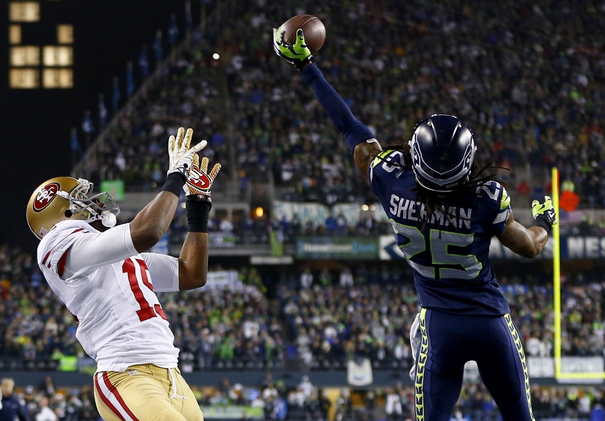Richard Sherman: More Than Meets the Eye
If you were to ask the average person what they know about Richard Sherman, they’d probably say some of the following: Richard Sherman is an NFL cornerback for the Seattle Seahawks. He has played in the NFL for three years, makes 465,000 U.S. dollars a year and wears number 25 on his back. He attended Dominguez High School, starring in football and track and field. He was a scholar-athlete and Salutatorian in his high school class. He attended Stanford University where he was named Freshman All-American, as a wide receiver. He graduated in 2010 with a degree in communication and returned in order to begin a Master’s degree.
Anyone could tell you these statistics, but after his interview with Fox sports reporter, Erin Andrews, it was hard for some to see past the obvious.
He’s African American, measures 6 feet and 3 inches, weighs 195 pounds and has a head full of dreadlocks.
Minutes before the end of the game on Sunday evening, Sherman broke up a pass to San Francisco’s receiver, Michael Crabtree, winning the game for the Seahawks. When the game finished, Sherman approached Crabtree and his mic caught his words, “Hell of a game. Hell of a game.” Crabtree swatted at his helmet. A heated Sherman stormed off the field and was grabbed by Andrews. The interview went as follows:
Andrews: The final play, take me through it?
Sherman: Well I’m the best corner in the game! When you try me against a sorry receiver like Crabtree, that’s the result you gonna get! Don’t you ever talk about me!”
Andrews: Who was talking about you?
Sherman: Crabtree! Don’t you open your mouth about the best or I’m gonna shut it for you real quick! LOB! (Referencing the Seattle defense’s nickname: Legion of Boom)
Sherman’s intimidating looks, aggressive words and the startled look on Andrew’s face caused people across the country to broadcast their opinions all over social media, especially Twitter. Despite what people knew (or didn’t know) about Sherman, he was labeled a variety of offensive and disturbing names, but the most commonly used phrase was thug.
Webster’s Dictionary defines thug as “a violent criminal.” Sherman has no criminal record. He was not physically violent during any part of the interview. But after hearing Sherman’s “rant” many people felt the word “thug” described him quite well.
“I was on a football field showing passion. Maybe it was misdirected, maybe it was immature, maybe things could have been worded better. But this was on a football field — I wasn’t committing any crimes or doing anything illegal; I was showing passion after a football game,” Sherman explains at a press conference.
“People always say, ‘Don’t judge a book by its cover,’ and then they judge a book by its cover. They’re judging me from the football field right after a game, and not who I am,” Sherman expressed his dissatisfaction with the way people reacted.
He’s articulating a big problem we have in our society. We teach children, you can’t judge a person based on their looks. We teach them everyone has a story; you just have to take the time to hear it. We think just saying these lessons clears our consciences of any wrong doing. Yet we fail to practice what we preach. The ridged stereotypes stay firmly in place.
Not every athlete is Peyton Manning: A classic family man, who’s well spoken, never breaks the rules, and has exceptional talent. That’s what is expected of professional athletes today and when someone breaks out of the “safe zone” they receive the backlash the Richard Sherman received following his interview.
It’s easy to ignore Sherman’s intelligence and outgoing personality. It’s easy to mistake his passion as a threat. It’s easy to think you know the type of person he is based on a 30 second clip on your TV.
At this point, easy is not an excuse.
It shouldn’t be easy to associate someone with something they’re clearly not. We should’ve moved beyond this simple minded thinking process, but we haven’t. What’s stopping you?










